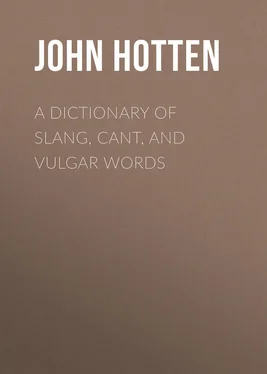The word Slang assumed various meanings amongst costermongers, beggars, and vagabonds of all orders. It was, and is still, used to express cheating by false weights, a raree show, for retiring by a back door, for a watch-chain, and for their secret language.
North , in his Examen , p. 574, says, “I may note that the rabble first changed their title, and were called the mob in the assemblies of this [Green Ribbon] club. It was their beast of burden, and called first mobile vulgus , but fell naturally into the contraction of one syllable, and ever since is become proper English.” In the same work, p. 231, the disgraceful origin of SHAM is given.
It is rather singular that this popular journal should have contained a long article on Slang a short time ago.
The writer is quite correct in instancing this piece of fashionable twaddle. The mongrel formation is exceedingly amusing to a polite Parisian.
Savez vous cela?
From an early period politics and partyism have attracted unto themselves quaint Slang terms. Horace Walpole quotes a party nickname of February, 1742, as a Slang word of the day: – “The Tories declare against any further prosecution, if Tories there are, for now one hears of nothing but the BROAD-BOTTOM; it is the reigning Cant word, and means the taking all parties and people, indifferently, into the ministry.” Thus BROAD-BOTTOM in those days was Slang for coalition .
This is more especially an amusement with medical students, and is comparatively unknown out of London.
Edinburgh Review , October, 1853.
A term derived from the Record Newspaper , the exponent of this singular section of the Low, or so called Evangelical Church.
A preacher is said, in this phraseology, to be OWNED, when he makes many converts, and his converts are called his SEALS.
“All our newspapers contain more or less colloquial words; in fact, there seems no other way of expressing certain ideas connected with passing events of every-day life, with the requisite force and piquancy. In the English newspapers the same thing is observable, and certain of them contain more of the class denominated Slang words than our own.” — Bartlett’s Americanisms , p. x., 1859.
The terms leader and article can scarcely be called Slang, yet it would be desirable to know upon what authority they were first employed in their present peculiar sense.
For some account of the origin of these nicknames see under Mrs. Harrisin the Dictionary.
See Dictionary.












